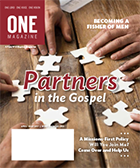
April-May 2017
Partners in
the Gospel
------------------
|






It's a Dog's Life: Chasing the Artificial
By Brenda Evans
You eat table scraps and scratch fleas.
Chase cars, harass cats, and sleep under the back porch. You get in trouble for barking too much at friends
and too little at strangers. You own no jeweled collars
or knitted sweaters. That’s a dog’s life.
But nowadays, if you are a dog, you may be more privileged. Pre-packaged doggy food. Shampoos,
trims, and blow-drys at canine salons. Flavored rawhide bones to gnaw on or electric doggy toothbrushes,
your choice. Trips to the beach, mountains, even Europe (Shut up in a dog carrier for the flight, of course,
but so what! it’s Europe.) Free-range on the sofa next to friends and kids and romps at the doggy park.
A good night’s sleep on a king-size bed at the feet of master and mistress.
What got me to thinking about a dog’s life was a little book about black-tailed prairie dogs I read last fall. It was called It’s a Dog’s Life. Of course, prairie dogs are no more canine than I am, but it seems they eat, sleep, work, socialize, watch for predators, and run around town like we do. (Also like us, their community of burrows is called a town.)
Unlike us, however, they do not tote AquafinaTM bottles on their jaunts because they rarely drink water. Their diet of weeds, roots, seeds, and blossoms gives them all the moisture they need. That’s why the little book warned me to resist the temptation to feed them because, though they like it, “artificial food” is bad for them, really bad. Human food, or artificial food as the author called it, is salty. If I feed a prairie dog my peanuts, popcorn, and chocolate, I may upset his salt and water balance and kill him.
I was struck by the author’s use of the phrase “artificial food.” To me, peanuts and popcorn are about as un-artificial as a snack ever gets, though they are salty. Chocolate, well, that’s another thing altogether. Obviously, it is manufactured. Dried cacao beans are shelled, fermented, ground, mixed with myriad other ingredients including salt, then heated, poured into molds, and cooled. Chocolate bars, drops, squares, chucks are all human-made and bad for black-tailed prairie dogs and us, too, except in deliberate moderation.

At about that same time last fall, I read Exodus 32 and again ran into artificial. It’s the passage about Aaron, a crowd of disgruntled Hebrews, and a human-manufactured god. These panic-stricken travelers asked for (demanded might be a better word) a fabricated god. They wanted a visible representation of Jehovah “to go before us,” as they said. A thing to see and touch, so they could know that he (or it) was present with them. So Aaron hand-made it, a golden calf, probably first carved of wood, then overlaid with gold melted down from the earrings of wives, sons, and daughters.
These wanderers were anxious people, edgy, and panic-stricken. I understand panic. What appeared to be Moses’ and God’s absences hounded them. They felt deserted, and desertions break faith, feel like betrayals. “This Moses,” as a few of the testier ones called him, had disappeared on the mountain, been gone for weeks, might be dead, burned by the fire of God that was up there with him, or swallowed alive by the cloud of God’s presence. Who knew anything for certain except that Moses and God’s presence had gone up the mountain together and now were nowhere to be seen. If not dead, maybe they simply were not interested anymore. That’s usually what absence means, isn’t it? People bolt because they no longer want to be bothered, or they simply don’t care.
I identify with the fear of abandonment. I want God’s presence, His attention. I want security and guidance. I want Someone alongside, in front, behind me. His invisibility can be hard. Sometimes, I think I’d like to see God’s fire and cloud though I’d probably be scared witless. I tend to cover my eyes or bury my face in my husband Bill’s shoulder on certain high-energy Disney World rides. I hold tight to guardrails overlooking precipitous cliffs. I skirt around deep water. What would I do before God’s fiery holiness and cloud of glory?
In that little prairie dog book, I was also struck by the phrase, “resist the temptation.” It sounded religious, although it wasn’t, of course. The author simply meant combat the urge to feed the prairie dogs artificial food that might do them harm.
The lure to take in and give out the artificial is always at my shoulder. It is easy to lean on artificial resources rather than on God: money, work, influence, and even human relationships. That last is the one on which I know I rest most heavily. Not that I’m saying human relationships are artificial, thus harmful and should be avoided. Not at all. But I am saying they are in some sense a man-made construct, a synthetic of sorts. We stitch and patch our relationships together from blood connections, psychological likenesses, hobbies, church, work, common interests, or goals. Some relationships are held together by love; others, by simple likes or dislikes. In either case, we fabricate them, although that word sounds too harsh. What I mean to say is that we make them because we want and need them.
Like the disgruntled Hebrews, I am susceptible to man-made things, visible things. I like to see the route ahead: the way out or through or back, whatever that best track is. I want paper maps, not GPS, because I can see where I am going. And I like someone beside me to touch, lean on, link arms with, and stand beside. The truth is, I’m basically chicken, especially about the future. Or, to put it as the Hebrews did, about what’s ahead. Going far and long by myself is no more alluring to me than it was to them. So I can’t point an accusing finger at these panic-stricken idol-fabricating Hebrews who, like me, wanted someone visible ahead of them for hope, security, and guidance. I can (and should) learn from them, however.
The truth is, I am not that different from the Hebrew wanderers. I’m tempted to choose gold over God. I’m wooed by the security of a safe home and reliable vehicle. More and more, I cling to steadfast human relationships: husband, family, brothers and sisters in the Lord, friends. These are visible things that give me the same thing those rank and file Hebrews wanted when they chose a golden calf—a visible somebody or something to show them the way ahead, to make sure things went well and kept them safe.
There is plenty of biblical praise for making wise choices about the visible things in our lives: our money, our work, and our human relationships. But there is no praise for substituting any of these visible things for our invisible Lord God. Artificial gods always have, always will, give artificial hope. Substitute gods of whatever time or place are still no better than trifling carvings of wood overlaid with insubstantial sheets of gold.
How well I remember the Lord’s promise my godly mother held in her heart and mind in 1980 when she first became a widow. She no longer had the visible partner to whom she had been married for 46 years. So, she memorized a special verse and repeated it to me many times over the next 32 years, as both a testimony about her real, though invisible God, and as a lesson to me when I fell into a tizzy:
“I will both lie down in peace, and sleep; For You alone, O Lord, make me dwell in safety” (Psalm 4:8).
When Mother was alone that first night, that first week, and all those long years that followed, she told me who was ahead, behind, and beside her. She rejected the temptation to look for something artificial. She wanted no substitute. She clung steadfastly to the real thing.
About the Writer: Brenda Evans is a freelance writer who lives in Ashland, Kentucky. Learn more about finances and how you can get involved in planned giving: www.fwbgifts.org.
|
|

